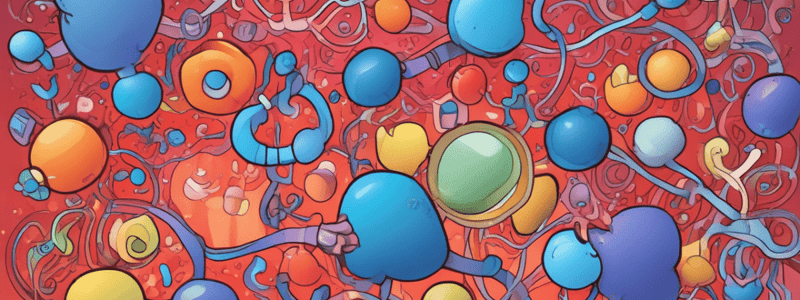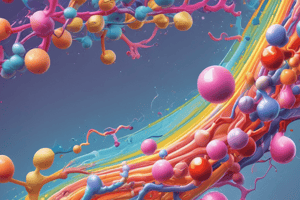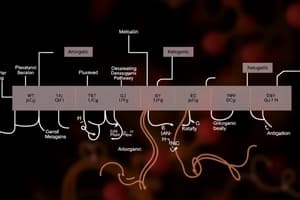Podcast
Questions and Answers
Which process involves converting other carbohydrates to glucose, but is not considered as gluconeogenesis?
Which process involves converting other carbohydrates to glucose, but is not considered as gluconeogenesis?
- Glycogenolysis
- Gluconeogenesis
- Glycolysis
- Glycogenesis (correct)
What is the primary substrate used in gluconeogenesis?
What is the primary substrate used in gluconeogenesis?
- Proteins
- Nucleic acids
- Carbohydrates (correct)
- Fats
Which process involves breaking down glycogen to release glucose into the bloodstream?
Which process involves breaking down glycogen to release glucose into the bloodstream?
- Glycogenolysis (correct)
- Ketogenesis
- Gluconeogenesis
- Glycolysis
In the context provided, what process specifically refers to the conversion of non-carbohydrate sources to glucose?
In the context provided, what process specifically refers to the conversion of non-carbohydrate sources to glucose?
Which metabolic pathway involves the breakdown of glucose into pyruvate?
Which metabolic pathway involves the breakdown of glucose into pyruvate?
What is the precursor for entering the glucogenic pathway?
What is the precursor for entering the glucogenic pathway?
What transformation does alanine undergo to enter the glucogenic pathway?
What transformation does alanine undergo to enter the glucogenic pathway?
Which keto acid does alanine become after transamination?
Which keto acid does alanine become after transamination?
What is the easiest amino acid to enter into the glucogenic pathway?
What is the easiest amino acid to enter into the glucogenic pathway?
Which metabolic pathway does alanine enter after transamination?
Which metabolic pathway does alanine enter after transamination?
What is the first step in the process described?
What is the first step in the process described?
What does the compound attach to in the process?
What does the compound attach to in the process?
Which step results in the activation of cAMP synthesis?
Which step results in the activation of cAMP synthesis?
What is the final step in the described process?
What is the final step in the described process?
Which component is responsible for activating protein kinase A in the process?
Which component is responsible for activating protein kinase A in the process?
What is the main difference between the enzymes in glycolysis and gluconeogenesis?
What is the main difference between the enzymes in glycolysis and gluconeogenesis?
Where does the process described occur, according to the text?
Where does the process described occur, according to the text?
What molecule provides both energy and a phosphate group for the phosphorylation of glucose in glycolysis?
What molecule provides both energy and a phosphate group for the phosphorylation of glucose in glycolysis?
Why is it necessary to couple the phosphorylation in glycolysis with ATP hydrolysis?
Why is it necessary to couple the phosphorylation in glycolysis with ATP hydrolysis?
Which of the following organs does NOT play a role in the process described?
Which of the following organs does NOT play a role in the process described?
What are the products when 1,3 bisphosphoglycerate is converted to glyceraldehyde 3-P during gluconeogenesis?
What are the products when 1,3 bisphosphoglycerate is converted to glyceraldehyde 3-P during gluconeogenesis?
What happens when 3-phosphoglycerate is converted to 1,3 bis-phosphoglycerate in gluconeogenesis?
What happens when 3-phosphoglycerate is converted to 1,3 bis-phosphoglycerate in gluconeogenesis?
Which molecules are oxidized into NAD+ during gluconeogenesis?
Which molecules are oxidized into NAD+ during gluconeogenesis?
What role does inorganic phosphate play in the conversion of 1,3 bisphosphoglycerate to glyceraldehyde 3-P?
What role does inorganic phosphate play in the conversion of 1,3 bisphosphoglycerate to glyceraldehyde 3-P?
How many ATP molecules are hydrolyzed to ADP during the conversion of 3-phosphoglycerate to 1,3 bis-phosphoglycerate?
How many ATP molecules are hydrolyzed to ADP during the conversion of 3-phosphoglycerate to 1,3 bis-phosphoglycerate?
Where does gluconeogenesis occur?
Where does gluconeogenesis occur?
Which component is NOT involved in gluconeogenesis?
Which component is NOT involved in gluconeogenesis?
When does gluconeogenesis primarily take place?
When does gluconeogenesis primarily take place?
Which of the following is NOT a site where gluconeogenesis occurs?
Which of the following is NOT a site where gluconeogenesis occurs?
Besides the liver and kidneys, where else can gluconeogenesis occur?
Besides the liver and kidneys, where else can gluconeogenesis occur?
What happens to glycerol once it is released from the adipocytes?
What happens to glycerol once it is released from the adipocytes?
How are fatty acids transported in the bloodstream?
How are fatty acids transported in the bloodstream?
What do different cell types primarily use fatty acids for?
What do different cell types primarily use fatty acids for?
Which protein serves as a carrier for glycerol in the bloodstream?
Which protein serves as a carrier for glycerol in the bloodstream?
How is glycerol related to the breakdown of fatty acids?
How is glycerol related to the breakdown of fatty acids?
Which process involves the synthesis of glucose from non-carbohydrate sources?
Which process involves the synthesis of glucose from non-carbohydrate sources?
What is the primary role of gluconeogenesis in metabolism?
What is the primary role of gluconeogenesis in metabolism?
What is the fate of alanine after undergoing transamination?
What is the fate of alanine after undergoing transamination?
Which organ primarily regulates the process of gluconeogenesis in the body?
Which organ primarily regulates the process of gluconeogenesis in the body?
What is the key purpose of gluconeogenesis in terms of maintaining blood glucose levels?
What is the key purpose of gluconeogenesis in terms of maintaining blood glucose levels?
What is the function of Glucose 6-phosphatase in relation to Hexokinase/Glucokinase?
What is the function of Glucose 6-phosphatase in relation to Hexokinase/Glucokinase?
Where does Glucose 6-phosphatase function in the cell?
Where does Glucose 6-phosphatase function in the cell?
Which transporter is responsible for transporting glucose from the endoplasmic reticulum to the cytosol in hepatocytes/kidney cells?
Which transporter is responsible for transporting glucose from the endoplasmic reticulum to the cytosol in hepatocytes/kidney cells?
After exiting the cell, how does glucose reach the bloodstream?
After exiting the cell, how does glucose reach the bloodstream?
What is the role of Hexokinase/Glucokinase in this process?
What is the role of Hexokinase/Glucokinase in this process?
Why is acetyl CoA specifically mentioned as the activator for pyruvate carboxylase?
Why is acetyl CoA specifically mentioned as the activator for pyruvate carboxylase?
What happens to the excess acetyl CoA that cannot be utilized by the Krebs cycle in fasting conditions?
What happens to the excess acetyl CoA that cannot be utilized by the Krebs cycle in fasting conditions?
In the context provided, what role does pyruvate carboxylase play in gluconeogenesis?
In the context provided, what role does pyruvate carboxylase play in gluconeogenesis?
What metabolic state of the cell triggers the activation of pyruvate carboxylase by acetyl CoA?
What metabolic state of the cell triggers the activation of pyruvate carboxylase by acetyl CoA?
Why does the cell require the activation of pyruvate carboxylase during fasting?
Why does the cell require the activation of pyruvate carboxylase during fasting?
Why is ATP not used in the dephosphorylation of Glucose 6-phosphate?
Why is ATP not used in the dephosphorylation of Glucose 6-phosphate?
What drives the dephosphorylation of Glucose 6-phosphate by the phosphatase enzyme?
What drives the dephosphorylation of Glucose 6-phosphate by the phosphatase enzyme?
In the context of the text, what is the significance of the negative ΔG in the dephosphorylation reaction?
In the context of the text, what is the significance of the negative ΔG in the dephosphorylation reaction?
Why does dephosphorylation of Glucose 6-phosphate not utilize ATP despite being an energy-requiring process?
Why does dephosphorylation of Glucose 6-phosphate not utilize ATP despite being an energy-requiring process?
What metabolic condition would likely alter the need for ATP in the dephosphorylation of Glucose 6-phosphate?
What metabolic condition would likely alter the need for ATP in the dephosphorylation of Glucose 6-phosphate?
What is the enzyme responsible for converting Phosphoenolpyruvate to pyruvate in the final step of glycolysis?
What is the enzyme responsible for converting Phosphoenolpyruvate to pyruvate in the final step of glycolysis?
In gluconeogenesis, which enzyme catalyzes the conversion of pyruvate to Phosphoenolpyruvate, the reverse reaction of the last step in glycolysis?
In gluconeogenesis, which enzyme catalyzes the conversion of pyruvate to Phosphoenolpyruvate, the reverse reaction of the last step in glycolysis?
Which molecule serves as the precursor for the synthesis of Phosphoenolpyruvate from pyruvate in gluconeogenesis?
Which molecule serves as the precursor for the synthesis of Phosphoenolpyruvate from pyruvate in gluconeogenesis?
Which of the following enzymes is NOT directly involved in the conversion of Phosphoenolpyruvate to pyruvate in glycolysis or its reverse reaction in gluconeogenesis?
Which of the following enzymes is NOT directly involved in the conversion of Phosphoenolpyruvate to pyruvate in glycolysis or its reverse reaction in gluconeogenesis?
Which of the following statements regarding Pyruvate kinase is INCORRECT in the context of glycolysis and gluconeogenesis?
Which of the following statements regarding Pyruvate kinase is INCORRECT in the context of glycolysis and gluconeogenesis?
What is the initial reaction that takes place in mitochondria involving pyruvate?
What is the initial reaction that takes place in mitochondria involving pyruvate?
Why is pyruvate carboxylase activation essential during fasting?
Why is pyruvate carboxylase activation essential during fasting?
What is the role of oxaloacetate in the context of pyruvate metabolism?
What is the role of oxaloacetate in the context of pyruvate metabolism?
Which enzyme is responsible for catalyzing the conversion of pyruvate to oxaloacetate in the mitochondria?
Which enzyme is responsible for catalyzing the conversion of pyruvate to oxaloacetate in the mitochondria?
Which substance is produced as a result of the reaction catalyzed by pyruvate carboxylase?
Which substance is produced as a result of the reaction catalyzed by pyruvate carboxylase?
What is the fate of inorganic phosphate in the conversion of 1,3 bisphosphoglycerate to glyceraldehyde 3-P during gluconeogenesis?
What is the fate of inorganic phosphate in the conversion of 1,3 bisphosphoglycerate to glyceraldehyde 3-P during gluconeogenesis?
What is the ultimate outcome of the ATP molecules hydrolyzed to ADP during the conversion of 3-phosphoglycerate to 1,3 bisphosphoglycerate in gluconeogenesis?
What is the ultimate outcome of the ATP molecules hydrolyzed to ADP during the conversion of 3-phosphoglycerate to 1,3 bisphosphoglycerate in gluconeogenesis?
What is the function of 1,3 bisphosphoglycerate in the context of gluconeogenesis?
What is the function of 1,3 bisphosphoglycerate in the context of gluconeogenesis?
How does NADH contribute to the conversion of 1,3 bisphosphoglycerate to glyceraldehyde 3-P?
How does NADH contribute to the conversion of 1,3 bisphosphoglycerate to glyceraldehyde 3-P?
What is the primary role of NAD+ in the context of gluconeogenesis?
What is the primary role of NAD+ in the context of gluconeogenesis?
What is the primary function of Glucose 6-phosphatase in gluconeogenesis?
What is the primary function of Glucose 6-phosphatase in gluconeogenesis?
Which type of transporters are responsible for facilitating the exit of glucose from hepatocytes/kidney cells in gluconeogenesis?
Which type of transporters are responsible for facilitating the exit of glucose from hepatocytes/kidney cells in gluconeogenesis?
What is the enzyme responsible for transporting glucose from the endoplasmic reticulum to the cytosol in hepatocytes/kidney cells during gluconeogenesis?
What is the enzyme responsible for transporting glucose from the endoplasmic reticulum to the cytosol in hepatocytes/kidney cells during gluconeogenesis?
What is the main difference between Glucose 6-phosphatase and Hexokinase/Glucokinase in terms of their roles in glucose metabolism?
What is the main difference between Glucose 6-phosphatase and Hexokinase/Glucokinase in terms of their roles in glucose metabolism?
In the context of gluconeogenesis, what is the primary role of Glute 7 existing on the ER membrane?
In the context of gluconeogenesis, what is the primary role of Glute 7 existing on the ER membrane?
Flashcards are hidden until you start studying




